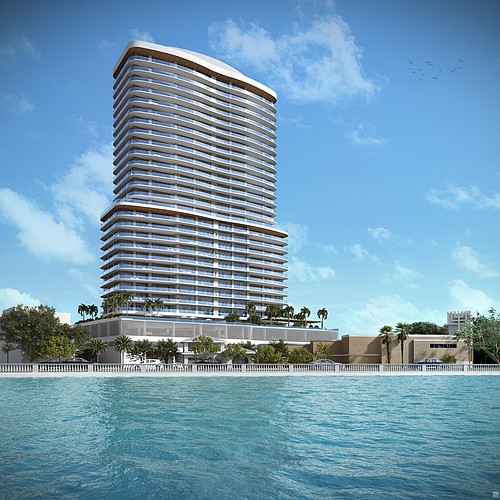- January 10, 2025
-
-
Loading

Loading

Tampa City Council has unanimously rejected a prominent Miami developer’s plan to transform a portion of a local synagogue’s property into luxury apartments.
Council members at a May 11 meeting voted down the proposal citing, in part, that The Related Group’s plan didn’t fit in with the character of the neighborhood.
The tower, which would have been built on property now owned by Congregation Rodeph Sholom, is on Bayshore Boulevard, one of the highest-dollar addresses in the city. It is also on a portion of the boulevard that’s seen a number of residential towers begin construction in the past couple of years. Among those is The Ritz-Carlton Residences that Related is building about a half mile from the synagogue.
“I find it’s not compatible with the surrounding neighborhood,” council member Lynn Hurtak says. Hurtak called for the vote to strike down the proposal. Council member Bill Carlson, who represents South Tampa where the project is located, did not attend the meeting.
The synagogue’s property sits on what is arguably one of the most expensive and exclusive stretches of land in Tampa Bay. It saw selling the portion of property, which includes a parking and a preschool, as way to make sure it could stay on the site for years to come. A sale price was never disclosed.
“We are disappointed by tonight’s city council vote. The development of a portion of our land would have ensured Rodeph Sholom’s continued presence on Bayshore Boulevard for many generations to come,” Lloyd Stern, president of Congregation Rodeph Sholom’s board of directors, says in a statement. “We will continue to explore our options moving forward.”
Council turned down the plan after Related made changes to its original proposal in order to address concerns and to win support from the dais. Among the changes made was cutting down the number of units from 60 to 50.
Other changes included a four-story parking and amenity deck being set back 10.9 feet from the north property line and 10 feet from the south property line and the residential tower being set back 43.2 feet from the north property line and 56.1 feet from the south property line.
It also committed to sign a restrictive covenant that guarantees no more than 50 units would be built on the property to address worries that the project is creating too much density.
Related had also pulled a request for a change to Tampa’s Comprehensive Plan that, in theory, would have allowed it to add to the development in future years. Instead, it asked for a rezoning to residential single family from medium density.
Despite the changes, some critics weren’t swayed, given a large number attending the meeting. Supporters of the plan were out in force as well.
In addition to the in-person opposition, a petition had been submitted saying the building, if allowed, would be built in a FEMA flood zone and that the presence of residents living in 50 units would have “an adverse effect on storm evacuation times and overburden hurricane evacuation routes and shelter capacities.”
The petition went on to say that the tower impinges on the privacy of neighbors and would economically impact the Tampa Garden Club next to the synagogue,
What happens next is not clear. An attorney working on the project for Related did not respond to a text asking if the deal was completely dead or if the plan would be revised again.